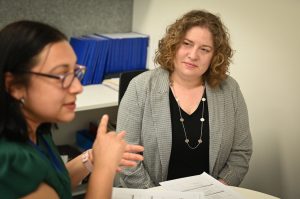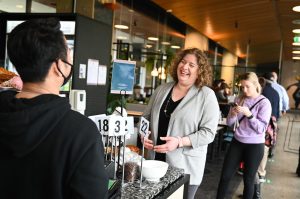Rachel Averbukh, the new Director of the Catholic Archdiocese of Melbourne’s Safeguarding Unit, says it’s ‘a bit of a no brainer that the values of safeguarding align so beautifully with the values of the Catholic Church. [We have] such a wonderful opportunity to partner together and continue to work towards a safe environment for everybody,’ she says.
Having joined the Archdiocese in June, Rachel is excited by the opportunity to work with ‘one of the largest archdioceses in the world, which has such a tremendous impact on so many families and communities.’ As well as promoting the protection of vulnerable children and young people, she’s keen to extend the focus to vulnerable adults and indeed to everyone, with the aim of helping every person to be and feel safe at all times. ‘And where is that more relevant,’ she says, ‘than in a religious environment?’
Serving the most vulnerable
A social worker by qualification, Rachel says she has always worked to support vulnerable people and communities without a voice, especially children, young people and families, ‘which have been a passion of mine’. In the early days of her social work career, working in health and in child protection, though, she soon became frustrated with some of the limits on what she could achieve.
‘I felt that working on the frontline, you really couldn’t make those big, bold changes that the system really needed,’ she says. ‘So I very quickly went back to my academic roots and started looking at, how can we transform policy and procedure to actually change the lives of the most vulnerable members of our community?’
‘It was a really interesting time to be developing research and looking at how you can transform the lives of the most vulnerable,’ she says. But going from the frontline to being in ‘an ivory tower’ in the academic world, she felt too far removed, so she ‘started dabbling’ in a variety of spaces, working with different groups.
As manager of the Child Wise national child abuse helpline, for instance, Rachel heard the perspectives of a wide variety of people, from perpetrators to children, educators, community members and concerned neighbours, who were ‘picking up a phone and saying, I’ve seen this or I’ve heard this, is this right?—almost vetting what they were talking about before reaching out to Child Protection.’
During the Royal Commission into Institutional Responses to Child Sexual Abuse, she noticed a shift in the language and narrative around safeguarding. No longer dismissing it as ‘private family business’, people were beginning to say, ‘Well, I actually have a privileged position as an adult in this community to be a voice for those who can’t speak for themselves.’
While continuing to work in the academic world as an assistant lecturer, she also helped to develop policies and procedures for a range of organisations who were beginning to look at their safeguarding responsibilities and how they might support children and young people. In light of the Royal Commission, much of this work was ‘very compliance heavy’, she says, ‘but it was a start.’
One of the groups she worked with was a community organisation supporting people of all different levels of observance of the Jewish faith—an experience that gave her a greater appreciation of the ‘nuances and challenges’ of promoting a safeguarding culture in ways that are sensitive to the unique needs of different communities.
Through experiences such as these, she honed her policy-development skills, coming to recognise that ‘this idea of having this beautiful safeguarding policy that sits pride of place on a bookshelf is basically useless if the community itself doesn’t connect with it, understand it and feel that they’ve been heard and represented accordingly.’ Increasingly, she saw herself not as ‘the expert coming in and having the answers’, but rather as someone who could ask the right questions, understanding that ‘everyone has a part to play.’

As a broader range of safeguarding job opportunities began to emerge, Rachel took a role with the AFL. One of the advantages of sport, she says, is that it ‘reaches so many different communities and populations that potentially otherwise wouldn’t be reachable … There’s rarely a population that is untouched by sport in this country, so it was an opportunity to really spread that messaging wide and far.’
When COVID interrupted her work with the AFL, she moved to the Salvation Army, managing their safeguarding team, before joining Sport Integrity Australia (formerly ASADA), an organisation that combined all the integrity issues for sport into one area and where she helped to promote safeguarding from the level of all the national sporting codes right down to the grassroots level.
Future horizons
Coming to work for the Archdiocese, Rachel feels very fortunate to be surrounded by a great team and to work for an organisation that ‘advocates for safeguarding, where you’re not battling, you’re actually working together to create that change.’
Recently, with Pathways Victoria taking over responsibility for investigating safeguarding incidents, capacity has been opened up for the Safeguarding Unit to ‘think a little bit more creatively’, Rachel says.
So there are opportunities for us to really partner with the parishes, to actually speak to them and find out how they’re going with their safeguarding journey and what’s working well for them and where else we can provide additional support. My team are doing an incredible job partnering with communities to help them to build their own capacity.
As she points out, though, there’s always more work to be done. She’s looking forward to ‘finding opportunities to really welcome the voice of children, of young people, of vulnerable members to be able to share their own perspectives … It’s not just about us speaking on behalf of [vulnerable people] but rather building them up so that they can actually speak for themselves.’
A new suite of updated policies and educational material will be released shortly, and then the team will be looking for more opportunities to visit parishes and find out what ‘really makes them tick when it comes to safeguarding’. Rachel is keen to find some great examples that can be shared throughout the Archdiocese ‘so that we can lead by example’, especially when it comes to engaging with children and young people.
She recognises, though, there is still a lot for her to learn about the Archdiocese. ‘It’s quite a unique environment and quite a complex environment’, she notes, ‘so I’m really just trying to take the time … to actually get to know all the different parts to the Archdiocese and where I can best place my support and my services.’

‘Where we start matters’
Reflecting on the theme for Child Protection Week this year—‘Where we start matters’—Rachel acknowledges that knowing where to start can be daunting for many people.
‘I don’t think I’ve met anyone that hasn’t been overwhelmed by the concept of safeguarding,’ she says, ‘because it’s such an important task. But the truth is you have to start somewhere. And it can be something as simple as, with your ‘parent’s hat’ on, asking a service some questions before you leave your child, like: Do you have a safeguarding policy? Can I have look?
‘You know, there are so many different things that we can do as a community. It could be as simple as offering a hand to someone around us who looks like they’re struggling and help them to feel supported … Everyone has a part to play in safeguarding and really it’s about educating yourself—completing the training, making sure you understand the fundamentals, … becoming aware of any policies that you need to be meeting as an employee. Do you have a code of conduct that you need to be conscious of, not only for your own conduct, but for the conduct of those around you?’
Rachel points out that people are far less likely to take advantage of vulnerable people in organisations where everyone feels a sense of responsibility for ensuring their protection and where there is an overt safeguarding culture, with clear checks and balances and a demonstrated commitment to advocating for vulnerable people and calling out code-of-conduct breaches.
While safeguarding can certainly be ‘an extremely traumatic environment’, Rachel also finds it to be ‘a wonderfully inspiring space to work, because the truth is it’s about building strengths and capacity within a community, and it’s about giving a voice to those who wouldn’t necessarily have one.’
One of the things that sustains and motivates her in her work is her own kids. ‘I see the fortunate and safe life that they lead, and I want that for every child and young person. I don’t want any person to come into contact with their church, with their parish, and to walk away worse off than when they arrived.’
Rachel is encouraged by ‘the potential to create significant and long-term change, [so] that the children of the next generation will hopefully never have to experience some of the wrongdoings of the past.’
While we ‘can’t undo’ these past wrongs, she says, ‘we can be compassionate and we can hear people’s stories when they’re willing to share them, and we can listen to survivors and be guided by what their needs are. And having that lens across everything that we do will help to make us … a safeguarded organisation that is considerate of the most vulnerable members, hopefully learning from the past and moving forwards to a brighter future.’
Written by Melbourne Catholic